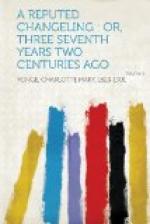Of these there were plenty; and as the clerk asked for his description, all eyes turned on the tall and robust form in the prime of manhood, with the noble resolute expression on his fine features and steadfast eyes, except when, as he looked at his father, they were full of infinite pity. The brown hair hung over the rich gold-laced white coat, faced with black, and with a broad gold-coloured sash fringed with black over his shoulder, and there was a look of distinction about him that made his answer only natural. “Charles Archfield, of Archfield House, Fareham, Lieutenant-Colonel of his Imperial Majesty’s Light Dragoons, Knight of the Holy Roman Empire. Must I give up my sword like a prisoner of war?” he asked, with a smile.
Sir Philip rose to his feet with an earnest trembling entreaty that bail might be taken for him, and many voices of gentlemen and men of substance made offers of it. There was a little consultation, and it was ruled that bail might be accepted under the circumstances, and Charles bowed his thanks to the distant and gave his hand to the nearer, while Mr. Eyre of Botley Grange, and Mr. Brocas of Roche Court, were accepted as sureties. The gentle old face of Mr. Cromwell of Hursley, was raised to poor old Sir Philip’s with the words, spoken with a remnant of the authority of the Protector: “Your son has spoken like a brave man, sir; God bless you, and bring you well through it.”
Charles was then asked whether he wished for time to collect witnesses. “No, my lord,” he said. “I thank you heartily, but I have no one to call, and the sooner this is over the better for all.”
After a little consultation it was found that the Grand Jury had not been dismissed, and could find a true bill against him; and it was decided that the trial should take place after the rest of the criminal cases were disposed of.
This settled, the sorrowful party with the strangely welcomed son were free to return to their quarters at the George. Mr. Cromwell pressed forward to beg that they would make use of his coach. It was a kind thought, for Sir Philip hung feebly on his son’s arm, and to pass through the curious throng would have been distressing. After helping him in, Charles turned and demanded—
“Where is she, the young gentlewoman, Miss Woodford?”
She was just within, her uncle waiting to take her out till the crowd’s attention should be called off. Charles lifted her in, and Sir Edmund and Dr. Woodford followed him, for there was plenty of room in the capacious vehicle.
Nobody spoke in the very short interval the four horses took in getting themselves out of the space in front of the County Hall and down the hill to the George. Only Charles had leant forward, taken Anne’s hand, drawn it to his lips, and then kept fast hold of it.
They were all in the room at the inn at last, they hardly knew how; indeed, as Charles was about to shut the door there was a smack on his back, and there stood Sedley holding out his hand.




